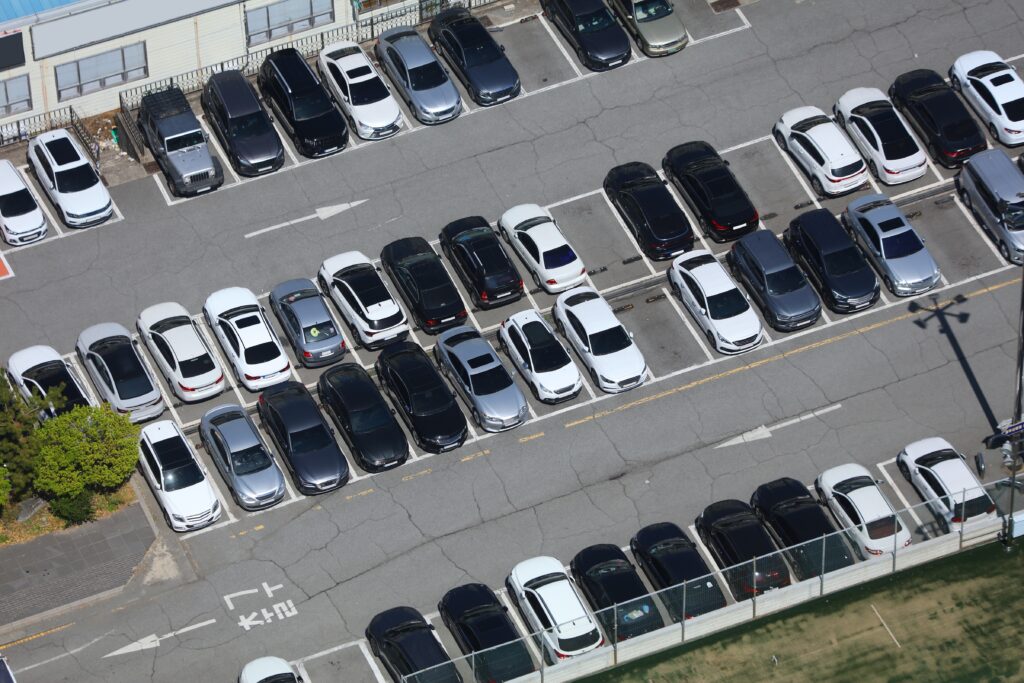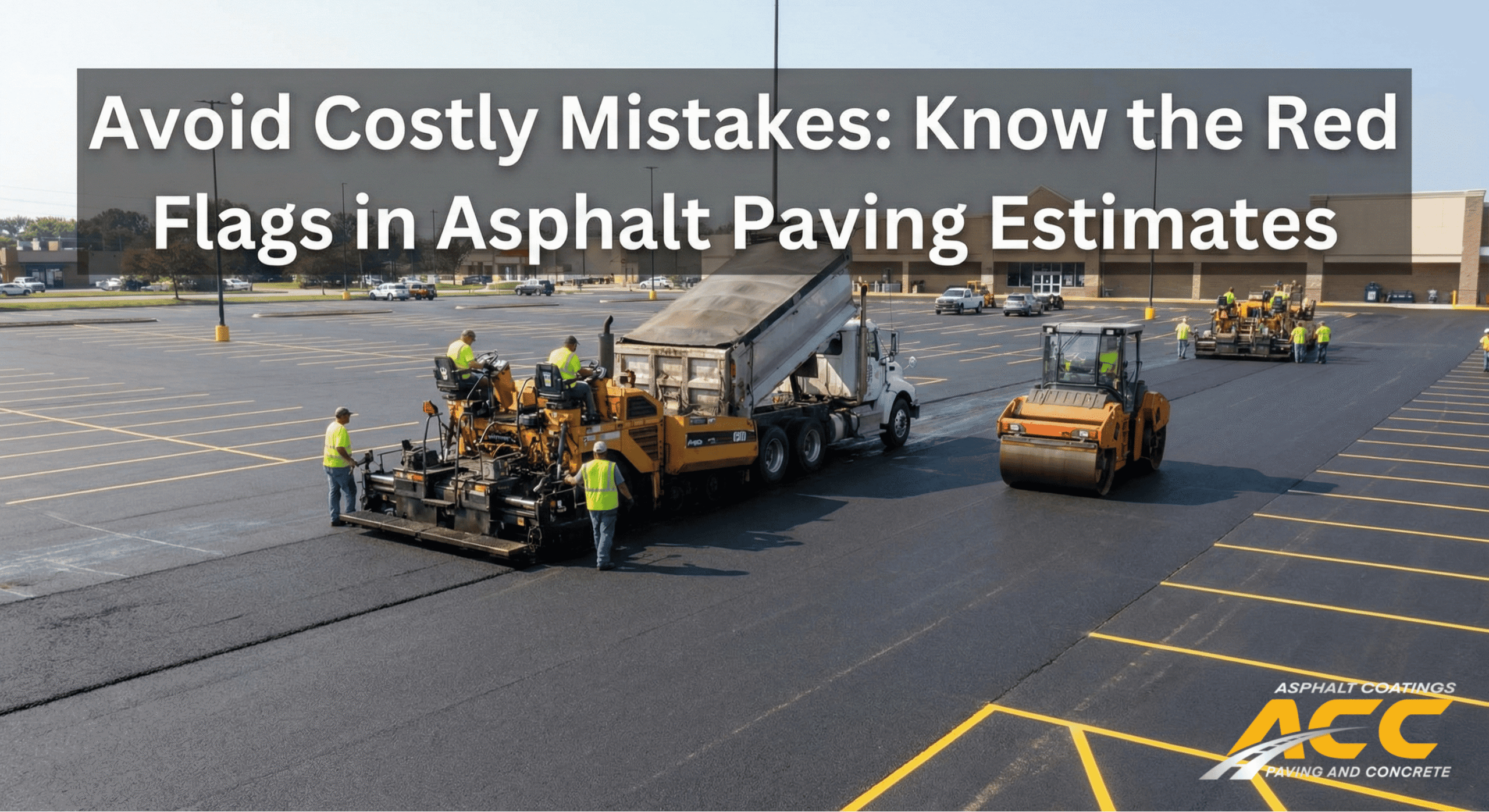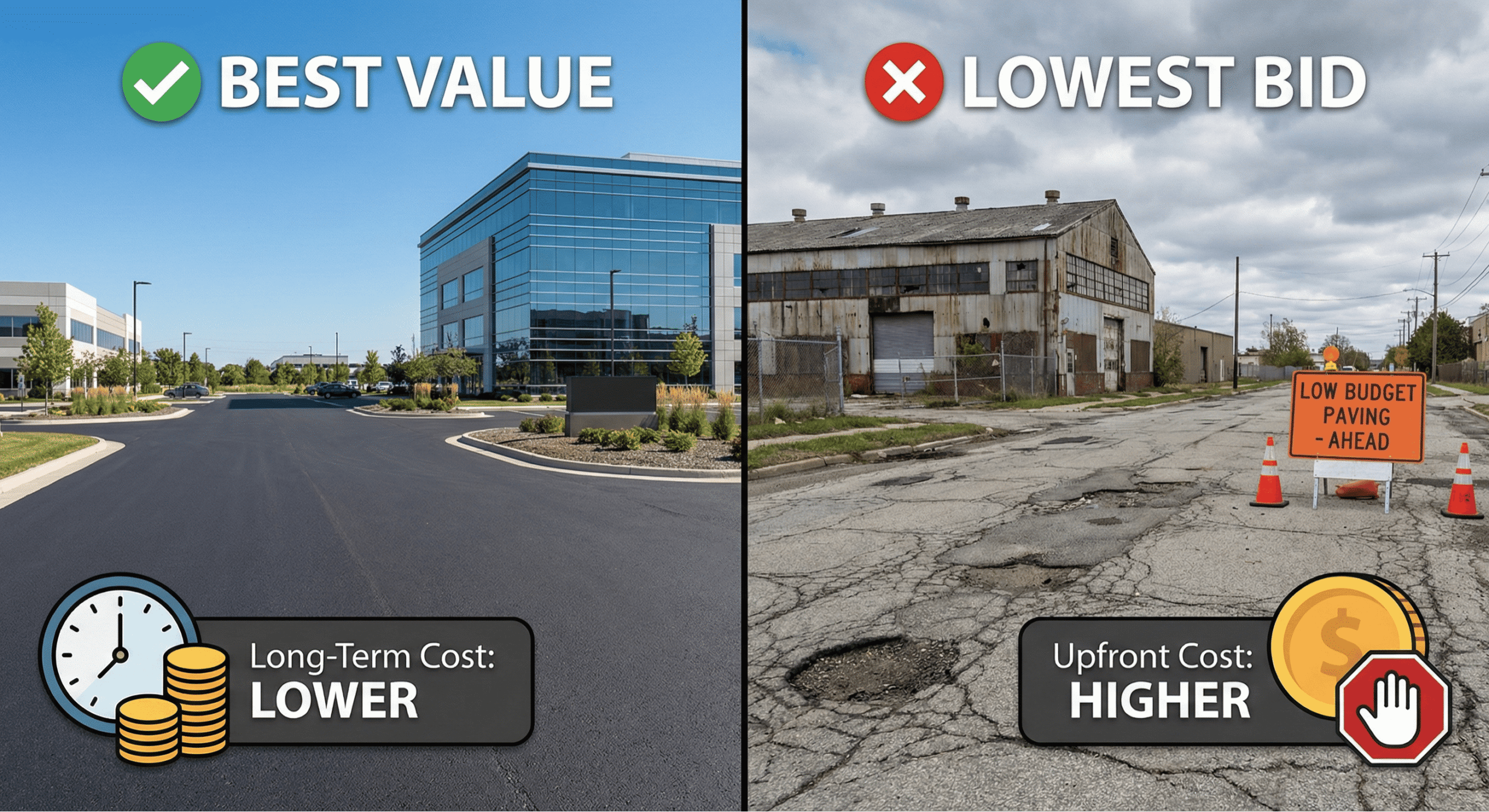
Designing and maintaining a parking lot might seem simple, but it is more than just pouring concrete and painting lines. Meeting the Americans with Disabilities Act (ADA) standards is an essential part of creating an accessible and compliant property. In Denver, where accessibility, weather durability, and city inspections are important, ADA compliant sidewalk design is about safety, fairness, and quality craftsmanship.
Concrete work that meets ADA standards allows everyone to move safely and easily. Whether it is a grocery store, medical facility, or retail plaza, ADA-compliant parking areas help individuals with disabilities navigate from their vehicles to the entrance without difficulty. The U.S. Department of Justice’s 2010 ADA Standards for Accessible Design set requirements for parking lots that are still in effect today, including proper slope, stable surfaces, accessible signage, and the correct number of designated spaces.
This blog will explain why ADA compliance matters, the standards that guide it, and how quality concrete work keeps Denver parking lots safe and durable for years.
Building Accessibility from the Ground Up: Why ADA Compliance Matters
Creating a truly accessible parking lot begins long before the first layer of concrete is poured. It starts with understanding how every slope, surface, and transition affects people who rely on safe, predictable pathways. In Denver, where the weather can shift from sunshine to snow in a single afternoon, ADA-compliant construction becomes even more essential.
It’s not only about meeting legal standards, it’s about creating spaces that reflect respect, equality, and lasting functionality for everyone who visits your property.
Let’s discuss the importance of ADA compliance.
ADA Compliance is About Inclusion, Not Just Rules
Accessibility isn’t just a regulation, but it’s a promise of equality. When parking lots are designed without ADA standards in mind, they unintentionally create barriers for people who depend on mobility aids, walkers, or wheelchairs. Properly designed, ADA-compliant concrete work gives everyone safe and equal access to your property, turning what could be an obstacle into a welcoming path.
Why Denver Businesses Can’t Overlook Accessibility
In a city like Denver, ADA compliance carries even more weight. From historic buildings to new developments, each property faces unique challenges due to elevation changes, weather, and age. Uneven ground, cracked surfaces, or sloped driveways can easily push a lot out of compliance.
ADA-compliant concrete work eliminates those concerns by ensuring smooth, slip-resistant, and properly graded surfaces that stay level through every season. Even a single inch of improper slope or a misplaced curb ramp can make a parking space unsafe or unusable for someone with limited mobility.
What the ADA Standards Actually Require
According to the U.S. Access Board, accessible parking spaces must be built on level ground with a maximum slope of 1:48 in any direction. This gentle incline ensures that wheelchairs and mobility aids can move safely without rolling or tipping unexpectedly.
These technical details might seem small, but they make a big difference in real-world safety. When Denver contractors pour concrete with the right slope and finish, they’re not just meeting a regulation, but they’re building peace of mind.
Legal Protection and Lasting Value for Property Owners
Beyond ethical considerations, ADA compliance also protects businesses from potential penalties and lawsuits. Failing to meet accessibility standards can result in costly reconstruction or legal disputes that disrupt operations. I
Investing in professional, ADA-compliant concrete work early on prevents these issues before they start. For Denver property owners, compliance isn’t just about doing what’s required; it’s about building a reputation for responsibility, safety, and community trust.
Why is ADA compliance essential in Denver?
Denver’s climate and terrain make accessibility a challenge, as freeze-thaw cycles, sloped lots, and aging infrastructure can quickly push properties out of compliance. Following ADA standards helps businesses maintain safe, level, and durable surfaces for everyone.
Precision and Planning: How ADA Standards Shape Every Inch of Concrete
Concrete work for ADA compliance requires precision, but here every inch matters. A well-poured parking lot starts with proper site preparation and grading. Contractors must account for how water drains, where ramps meet sidewalks, and how surface textures will behave in changing Denver weather.
Let’s discover the whole scenario behind the perfection of concrete.
The Art of Slope and Drainage
ADA standards specify that accessible parking spaces, aisles, and routes must maintain a consistent slope not exceeding 2%. That may seem minimal, but even a slightly uneven pour can cause compliance failures. Denver’s freeze-thaw cycles make this even trickier, as the ground expands and contracts. Skilled contractors use reinforced concrete mixes and proper jointing techniques to maintain the correct grade over time.
If slopes aren’t handled carefully, water can pool or freeze, creating dangerous conditions for wheelchair users and pedestrians. The U.S. Environmental Protection Agency (EPA) notes that poor stormwater management in paved areas can also increase runoff and erosion, making compliant drainage design not only safer but also more environmentally responsible.
For additional guidance, the U.S. Department of Justice provides detailed checklists and inspection standards to help builders and property owners ensure their parking lots comply with ADA accessibility requirements.
Smooth, Stable, and Slip-Resistant Surfaces
ADA standards also require surfaces to be firm, stable, and slip-resistant. Concrete, when properly finished, provides a texture that balances traction and smoothness. In Denver, where ice and snow are regular visitors, this requirement is critical. Using the right finish helps prevent slips while ensuring wheelchairs can roll easily without bumps or cracks.
Ramps, Transitions, and Detectable Warnings
Accessible routes from parking areas to building entrances must include ramps and transitions that meet specific height and slope standards. Detectable warning surfaces, those textured panels often seen at crosswalks or curb ramps, help visually impaired individuals detect when they’re leaving a safe walkway. These small but vital details must be integrated carefully into the concrete pour, ensuring both durability and compliance.
Why does surface texture matter for ADA compliance?
Surface texture affects traction and mobility. Smooth yet slip-resistant finishes help users navigate safely, especially during Denver’s snowy and icy months. Poor finishing can create hazards or noncompliant surfaces.
Concrete That Lasts: Why Denver’s Climate Demands ADA-Smart Construction

Denver’s elevation and climate present unique challenges for concrete work. The city experiences wide temperature swings, with hot summers, snowy winters, and frequent freeze-thaw cycles. These shifts can wreak havoc on poorly built parking lots, causing cracks, uneven surfaces, and standing water, all of which compromise ADA compliance.
How Weather Impacts Accessibility
When concrete expands and contracts, it can lead to uneven joints or heaving that makes paths difficult to navigate for wheelchairs or walkers. Once a surface loses its levelness, it no longer meets ADA slope requirements. Denver’s thin air also accelerates curing, so timing and moisture control are essential. Professional contractors know how to account for these environmental conditions, ensuring each section of concrete cures evenly and maintains its integrity through every season.
Materials and Techniques for Longevity
Quality ADA-compliant concrete work relies on the right materials and craftsmanship. Reinforced concrete, proper base compaction, and well-sealed joints prevent shifting and cracking. Using high-strength mixes and additives designed for freeze resistance helps the concrete withstand Denver’s weather.
When contractors apply a textured, slip-resistant finish, it keeps the surface safe even during icy conditions, meeting ADA’s requirement for stability and safety year-round.
Local Codes and Collaboration
While ADA standards provide the national framework, Denver also enforces local codes that align with or strengthen these requirements. Experienced contractors stay informed about both federal and municipal standards to avoid costly oversights. Collaborating with city inspectors early in the project ensures that the finished parking lot meets every compliance detail the first time around.
Designing ADA-Compliant Concrete with Purpose: The Human Side of Accessibility
Building an ADA-compliant parking lot isn’t just a technical requirement, but it’s a reflection of how a business values people. In Denver, where accessibility and community inclusion go hand in hand, designing with purpose means understanding that concrete work can directly influence how welcome someone feels on your property. Every ramp, slope, and smooth pathway contributes to independence, safety, and comfort for individuals of all abilities.
Let’s have a look.
Beyond Concrete: Creating a Sense of Belonging
ADA-compliant design goes deeper than measurements and codes, but it builds dignity. When someone with limited mobility can park easily, navigate safely, and reach your front door without struggle, that experience leaves a lasting impression. It tells customers that your business cares about them as individuals, not just visitors.
This emotional connection transforms accessibility into a form of hospitality, one that strengthens trust and brand reputation in Denver’s community-driven environment.
Accessibility as a Business Advantage
While ADA compliance fulfills a moral and legal duty, it’s also a smart business move. Accessible properties attract more visitors, including families with strollers, seniors, and people with temporary injuries. A well-designed, compliant parking lot signals professionalism and care, qualities that appeal to both customers and tenants. Many Denver property managers have found that making their lots ADA-friendly improves overall traffic flow, reduces liability, and enhances long-term property value.
Community, Equity, and the Bigger Picture
Accessibility contributes to the fabric of a stronger city. The U.S. Department of Transportation emphasizes that inclusive design helps create equitable access to jobs, services, and social spaces. When every business does its part, cities like Denver become more navigable, connected, and inclusive for everyone.
ADA-compliant concrete work may start with a single parking lot, but its impact ripples outward and improves the quality of life across entire communities.
From Compliance to Confidence: Partnering with the Right Professionals
Ensuring ADA compliance requires expertise and attention to detail at every stage, from design and preparation to pouring and finishing concrete. Choosing the right professionals is what transforms a project from basic to exceptional. In Denver’s demanding climate, where temperature swings and soil movement can challenge even the best materials, experienced contractors know how to build parking lots that stay compliant, safe, and durable for decades.
Expertise That Makes Compliance Simple
True ADA compliance is about precision. Skilled contractors understand how to calculate slopes, align grades, and control drainage without guesswork. They also know how to interpret both national ADA guidelines and local Denver building codes, ensuring every detail meets inspection requirements.
Their experience means smoother approvals, fewer delays, and better long-term performance for your property.
Planning for Sustainability and Longevity
Professional contractors also bring an eye for sustainability. Using high-quality concrete mixes, proper reinforcement, and weather-resistant sealants prevents cracks and surface distortion caused by Denver’s freeze-thaw cycles. A well-built, ADA-compliant surface doesn’t just meet today’s standards, but it also stands the test of time.
This commitment to quality ensures that accessible routes remain safe, reliable, and visually appealing long after installation.
Seamless Integration and Peace of Mind
When you hire professionals who specialize in ADA-compliant work, you gain confidence that every parking space, ramp, and walkway will pass inspection and perform beautifully. They handle the fine details, signage height, curb cuts, transitions, and textured warning surfaces, so you can focus on your business instead of worrying about compliance issues. The result is a finished project that reflects care, compliance, and craftsmanship in equal measure.
Is ADA compliance a one-time task or an ongoing responsibility?
ADA compliance must be maintained over time. Denver’s weather can cause cracks, heaving, or settlement, so regular inspections and maintenance help preserve accessibility year-round.
Paving the Way to an Accessible Future of ADA-Compliant Concrete Work
ADA-compliant concrete work isn’t just a construction standard, but it’s a reflection of a business’s values. In Denver, where weather, terrain, and local codes present unique challenges, building accessible parking lots requires skill, knowledge, and care. From the slope beneath the surface to the placement of every sign, compliance creates spaces that invite everyone to participate fully and safely.
That’s where Asphalt Coatings Company stands apart. As Denver’s trusted name in concrete and paving solutions, we bring years of experience, ensuring every project meets ADA standards with precision and durability. Our team understands that true accessibility starts at the ground level, with concrete work that’s crafted to last and designed to include.
If you want a parking lot that is safe, durable, and fully ADA-compliant, let Asphalt Coatings Company handle the work. Contact us today for a free consultation and see how our expertise can make your property accessible, professional, and welcoming to everyone.
Frequently Asked Questions
What does ADA mean in a parking lot?
The Americans with Disabilities Act
When state or local governments, businesses, and non-profit organizations provide parking lots or garages, accessible parking spaces complying with the Americans with Disabilities Act (ADA) must be provided. Accessible parking spaces are different than traditional parking spaces.
How important is ADA compliance?
Becoming ADA compliant is a proactive effort to not only make all organizations inclusive, but by make them accessible to all people, it’s a proactive way for organizations to grow. ADA compliance is short for the Americans with Disabilities Act Standards for Accessible Design.
What kind of concrete is used for parking lots?
Fiber-reinforced concrete incorporates fibers, such as steel or synthetic materials, into the concrete slabs to increase their strength and durability. This type of concrete is highly resistant to cracking and is excellent for parking lots exposed to frequent heavy loads and harsh conditions.
What are the key features of ADA?
Americans with Disabilities Act (ADA) The ADA prohibits discrimination based on disability in employment, State and local government, public accommodations, commercial facilities, transportation, and telecommunications. It also applies to the United States Congress.
What happens if you don’t follow ADA guidelines?
Organizations and businesses can be fined up to $75,000 for a single ADA violation, raising that fine to $150,000 for additional violations. This is a pretty large bill for most businesses and can have devastating effects.



